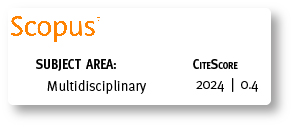Bridging the gap between industry and academia: Establishing an industry advisory board in Ecuador’s higher education system
DOI:
https://doi.org/10.18537/mskn.08.01.03Keywords:
Ecuador, hospitality and tourism, higher education, industry advisory board, Ley orgánica de Educación SuperiorAbstract
Considering the recent changes regarding curriculum redesign in Ecuador’s higher education, as stipulated in the Ley Orgánica de Educación Superior (LOES), this article discusses the benefits of the creation of an industry advisory board in a professional hospitality and tourism management program. Based on a review of the literature, the article argues that an industry advisory board is helpful in creating employment opportunities for students, research opportunities for faculty and engaging alumni in the academic program. Its members can provide academic programs with information on the latest industry trends and assist them in enhancing their community outreach efforts.
Downloads
Metrics
References
Aguiló Pérez E (1999). Consideraciones en torno a los trabajos y investigaciones sobre calidad en la formación turística. Cuadernos Turismo 4:7-19
Andrus DM, Martin D (2001). The development and management of a department of marketing advisory council. Journal of Marketing Education 23(3):216-227
Athavale M, Myring M, Davis R, Truell A (2010). Factors influencing success in integrating the four-year business school curriculum: Implications for business educators. The Journal of Research in Business Education 52(1):4-15
Avila SM, Bratton JC, Baur MN (2005). Developing an advisory board to enhance collegiate finance programs. Journal of Financial Education 31:1-13
Benigni V, Ferguson D, McGee B (2011). Establishing a “renown-gown” relationship: The role of advisory boards in communication programs. Journalism & Mass Communication Educator 66(1):54-68
Coe JJ (2008). Engineering advisory boards: Passive or proactive? Journal of Professional Issues in Engineering Education and Practice 134(1):7-11
Conroy PA, Lefever MM, Withiam G (1996). The value of college advisory boards. Cornell Hotel and Restaurant Administration Quarterly 37(4):85-89
Dorazio P (1996). Professional advisory boards: Fostering communication and collaboration between academe and industry. Business Communication Qaurterly 59(3):98-104
Egan D, Cockill J (2012). Enhancing student learning and development in cooperation with our alumni. Student Engagement and Experience Journal 1(1):1-12
Ellingson DA, Elbert DJ, Moser S (2010). Advisory councils for business colleges: Composition and utilization. American Journal of Business Education 3(1):1-8
Feyen J, Van Hoof HB (2013). An analysis of the relationship between higher education performance and socio-economic and technological performance indicators: A Latin-American case study. Maskana 4(2):1-20
Genheimer SR, Shehab RL (2009). A survey of industry advisory board operation and effectiveness in engineering education. Journal of Engineering Education 99(2):169-180
Hammond KL, Moser E (2009). Curriculum advice from your advisory board: A survey instrument. Academy of Educational Leadership Journal 13(3):59-72
Henderson JK (2004). A survey of advisory board ABSs…advice, balance, and charge. Journalims and Mass Communication Educator 59(1):60-76
Kaupins G, Coco M (2002). Administrator perceptions of business school advisory boards. Education 123(2):351-358
Kilcrease KM (2011). Faculty perceptions of business advisory boards: The challenge for effective communication. Journal of Education for Business 86(2):78-83
Lefever MM, Withiam G (1998). Curriculum review: How industry views hospitality education. Cornell Hotel and Restaurant Administration Quarterly 39(4):70-78
Mandviwalla M, Fadem B, Goul M, George JF, Hale DP (2015). Achieving academic-industry collaboration with departmental advisory boards. MIS Quarterly Review 14(1):17-35
McCleary KW, Lepisto LR, Damitio JW (1989). Alumni involvement with hospitality programs: Dedication and dollars. Journal of Hospitality and Tourism Research 13(3),541-543
McNamara A, Roat C, Kemper M (2012). Preparing nurses for the new world order: A faculty development focus. Nursing Administration Quarterly 36(3):253-259
McGill T, Armarego J, Koppi T (2012). The teaching-research-industry learning nexus in information and communications technology. ACM Transactions on Computing Education 12(1),1-20
Nagai J, Nehls K (2014). Non-alumni board volunteers. Innovative Higher Education 39(1):3-16
Newman S (2010). Indispensable traits of high performance advisory committees. Industry and Higher Education 24(1):11-15
Olson GA (2008). The importance of external advisory boards. Chronicle of Higher Education 54(24), C3
Pavesic DV (1993). Hospitality education 2005: Curricular and programmatic trends. Journal of Hospitality and Tourism Research 17(1):285-294
Penrose JM (2002). Strengthen your business communication program with an alumni advisory board. Business Communication Quarterly 65(4):73-84
Pilgrim CJ (2013). Industry involvement in ICT curriculum: A comparative study. Proceedings of the 2013 International Conference on Software Engineering, pp. 1148-1153
Rooney DM, Puerzer RJ (2002). The smaller engineering school and it industrial advisory board: An effective partnership. Frontiers Educaction 2:F1B-16-F1B-21
Rose JM (2006). Using a alumni interview to promote rhetorical sophistication. Business Communication Quarterly 69(3):284-292
Rose KJ, Stiefer TW (2013). Advisory councils in executive education: Insights from practice. Journal of Executive Education 12(1):1-12
Vega-Jurado JM, Fernández-de Lucio I, Huanca-López R (2007). La relación universidad-empresa en América Latina: Apropriación incorrecta de modelos foráneos. Journal of Technology Management and Innovation 2(3):97-109
Van Hoof HB (2015). Ecuador’s efforts to raise its research profile: The Prometeo grant program. Journal of Hispanic Higher Education 14(1):56-68
Van Hoof HB, Cueva A, Estrella M, Torres L, Eljuri MI (2014). Percepciones del sector empresarial sobre la educación de hospitalidad, gastronomia y turismo en el Ecuador. CULTUR 8(1):211-238
Van Hoof HB, Estrella M, Eljuri MI, Torres L (2013). Ecuador’s system of higher education in times of change. Journal of Hispanic Higher Education 12(4):345-355
Van Hoof HB, Verbeeten MJ, Estrella M (2015). Toward a hospitality management curriculum of the future: Addressing Ecuador’s student and industry needs. Atlante-Cuadernos de Educación y Desarollo 55:1-15
Weerts DJ, Ronca JM (2007). Profiles of supportive alumni: Donors, volunteers and those who “do it all.” International Journal of Educational Advancement 7(1):20-34
Weerts DJ, Ronca JM (2008). Characteristics of alumni donors who volunteer at their alma mater. Research in Higher Education 49(3):274-292
Downloads
Published
How to Cite
Issue
Section
License
Copyright © Autors. Creative Commons Attribution 4.0 License. for any article submitted from 6 June 2017 onwards. For manuscripts submitted before, the CC BY 3.0 License was used.
![]()
You are free to:
 |
Share — copy and redistribute the material in any medium or format |
 |
Adapt — remix, transform, and build upon the material for any purpose, even commercially. |
Under the following conditions:
 |
Attribution — You must give appropriate credit, provide a link to the licence, and indicate if changes were made. You may do so in any reasonable manner, but not in any way that suggests the licenser endorses you or your use. |
| No additional restrictions — You may not apply legal terms or technological measures that legally restrict others from doing anything the licence permits. |









